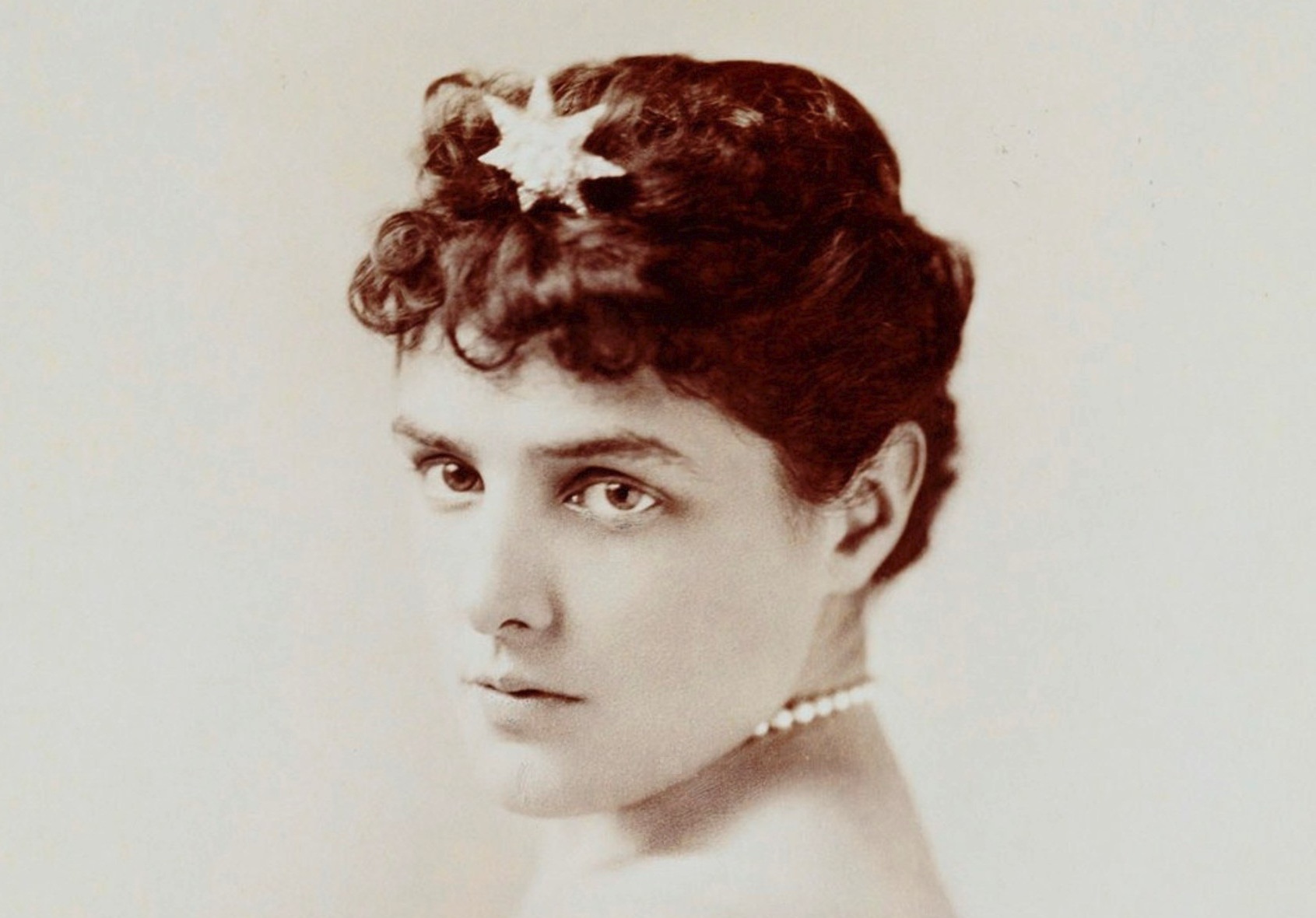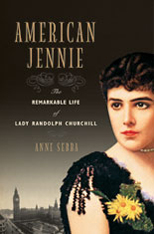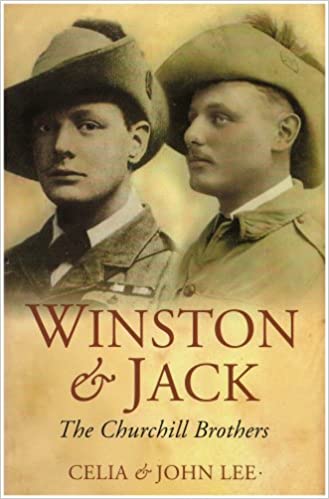
“American Jennie” and Other Books on Lady Randolph Churchill
A reader requests recommendations for good books about Sir Winston’s mother, Lady Randolph Churchill (1854-1921). The most rounded and thoroughly sourced is Anne Sebba’s American Jennie (2007). Barbara Langworth published a thorough review and analysis of Jennie’s many accomplishments, below. Scroll to the end for a Bibliography and commentary on other books about Lady Randolph. RML
Barbara F. Langworth: The Right Parent Survived
Jennie Churchill: Winston’s American Mother, by Anne Sebba (London, Murray, 2007). American Jennie: The Remarkable Life of Lady Randolph Churchill), (New York: Norton, 2007).
 It may seem a new story to many readers, since the previous biographies of Lady Randolph Churchill date back up to eight decades. Jennie published her own memoirs in 1908. Readers familiar with the Churchill saga wish to know if this latest book offers anything new. To some extent it does. Sebba writes well, accesses the latest sources, and punctures some myths.
It may seem a new story to many readers, since the previous biographies of Lady Randolph Churchill date back up to eight decades. Jennie published her own memoirs in 1908. Readers familiar with the Churchill saga wish to know if this latest book offers anything new. To some extent it does. Sebba writes well, accesses the latest sources, and punctures some myths.
Jennie’s influence in Winston’s life was considerable. She educated him, spent more time with him than most realize, and advanced his career as a writer and war correspondent. Much beloved, she died at 67.
In the 1990s we twice visited Sir Winston’s nephew, Peregrine Churchill, and his wife Yvonne, at their home in Hampshire. There we discussed the current raft of Jennie gossip. A lot of “neglected Winston” chatter was going round. Peregrine snorted at all that. He pulled out a box of Jennie’s diaries and letters to Winston, and began reading aloud. “Played all afternoon with Winston…” It was touching to hear her own words—hardly those of an uncaring, distant mother.
Anne Sebba’s book pulls together facts, discussions and controversy from previous books, adds new letters, and discusses recent Jennie historiography, producing informed conclusions about this ethereal, alluring being.
A fabled persona
There is a rounded mural of Jennie and her sisters, American girls in search of titles, who met British aristocrats in search of money. She was one of the most stunning women of her time, a “professional beauty.” (Victorians would collect photographs of lovely women.) Educated in France, she regaled London society.
Anne Sebba portrays Jennie as sexy, innovative and literate, her flirting persona irresistible to men. She was a concert pianist, artist, playwright, interior decorator. editor and author. (I had erroneously supposed that a famous sketch of Jennie by Singer Sargent was for a later portrait. Apparently it was done for the cover of a piano concert program she gave for charity.) Her rich life is the stuff of an outstanding seven-hour biography (see below).
The book mentions Jennie’s controversies, skirting conclusions when there are none to make. It is a near-certainty that Lord Randolph Churchill died of something besides syphilis—a brain tumor is the leading possibility. (See John Mather, “In Search of Lord Randolph Churchill’s Purported Syphilis.”) Indisputably, he was diagnosed with syphilis. So Sebba’s take is practical: He was told he had it. He believed he had it. His wife and son thought he had it. All their actions were based on the supposition that he did have it. Ergo, he might as well have had it.
This avoids a conclusion but does not challenge the truth in the way that vindictive or ignorant writers do, by referring, say, to “Winston’s syphilitic father” and moving on. As Dr. Mather has shown, Randolph’s malady was misdiagnosed from the start. Sebba’s thesis is not daring and her medical evidence inconclusive, but it is a safe position to take.
Is this fun for you?

Imagine what young Jennie must have felt. You meet this fantastic fellow. The sparks are potent, marriage is certain. Both sets of parents resist, but give in. Your first-born comes quickly. You then learn that your politician-husband is a flawed genius. At first brilliant and respected, Randolph excels in baiting the opposition. Self-willed and vindictive, he is withal not a very nice man. He quarrels with the Prince of Wales, “a great personage” in his son’s biography. That is not wise. A few years into your marriage, you find yourself ostracized from polite society. You end up in Ireland, in a kind of luxurious exile.
Another son, Jack, is born in Dublin, and speculation is rife. Is he Randolph’s son? Arguing strongly in favor of Jack’s legitimacy is his close resemblance to his grandfather, the 7th Duke of Marlborough. Arguing against is that he looks and acts nothing like his brother Winston. Why is this important? Surely what matters is that Winston and Jack were devoted to each other, enjoying a fond and close-knit family life.
Back in England, you’re told that Randolph has a sexually transmitted disease. You do much of his political campaigning, since he is perpetually ill. A few years pass and (diseased or not) he reaches one of the highest offices in the land, a step below prime minister—only to cast himself from the ladder in an ill-considered resignation, never to rise again, and to spend the rest of his life “dying by inches in public.” Not only that, he is hardly ever home, and when he is has a violent temper. Is this fun for you?
Jennie revelations
Unsurprisingly Jennie had numerous admirers—and lovers, whose number is hotly disputed by historians and seekers of the prurient. The author discusses Jennie’s one serious romance, with Karl, Count Kinsky, while she was still married. As Randolph neared death in 1894, she learned that Kinsky had become engaged—he needed the finances and progeny. She had hoped he would wait until Randolph had died (though there had been talk of divorce). Anne Sebba asks: what would have been the consequences for Winston? Suppose Jennie had married Kinsky, and put her energies into that relationship, instead of devoting herself to her son? Her efforts to advance his youthful career are well documented.
Given extant literature, it is encouraging to find new material in this book. One revelation was that Jennie had a serious illness and almost died in 1892. She had severe abdominal pains and was diagnosed with peritonitis and perhaps a tumor or cyst. Miraculously, it healed on its own. Think of the aftermath if Jennie had not been there to launch Winston on his career.
At the time of publication there was an intriguing publicity-rumor that Jennie had a snake tattoo on her wrist. There is a well-known photo of Jennie holding Peregrine. Her arms are bare, no sign of a tattoo. Nor is there on any other photo I have examined. The author duly displayed a snake on her arm in at least one of her book signings. I’m sure she meant it as a tribute, but it’s like Martin Gilbert at a book signing wearing a siren suit and homburg.
Salacious speculation
It is a shame that the publicity surrounding this biography focused so hard on the salacious. How many men did Jennie sleep with? Did Lord Randolph die of syphilis? Who was Jack Churchill’s father? Flyspeck issues obscuring what really matters is a feature of our age. What matters is that Jennie Churchill was a notable woman at a time when woman were mainly considered to be trophies, concubines or breeders.
She slept with men, though the number is vastly exaggerated. But while others of her class indulged in primping and fripperies, she raised the statesman of the century, produced a literary magazine, displayed multiple talents, raised money for charities, wrote literate memoirs, aided troops on the scene of battle, and set new standards in dress and manners. Anne Sebba suggests perceptively that while Randolph lived, he stood in the way of Winston’s aspirations. His death in 1895 was as crucial for Winston as the other things that happened that fateful year.
Jennie didn’t have the vote and didn’t want it. Yet she knew politics inside out, and probably influenced more votes than many in Parliament. If she were alive and sentient today, she could easily gain elective office. Her influence on her son, her efforts to launch him on his twin careers of writing and politics, far exceeded those of the father Winston held awe. For Winston Churchill, the right parent survived.
The author
Barbara Langworth was publisher of Finest Hour from 1982 to 2014 and contributed twenty installments of “Recipes from Number 10 for the modern kitchen.” She is the author of “Churchill and Polo” (2018), appearing in two parts for the Hillsdale College Churchill Project.
The Jennie bibliography
Mrs. George Cornwallis-West, The Reminiscences of Lady Randolph Churchill. London: Edward Arnold, 1908. A charming memoir, but discreet and circumspect. Victorian society as seen by a participant.
Kraus, René, Young Lady Randolph, New York: Putnam, 1943. A capable biography by a journeyman writer, who also produced a wartime biography of Winston and the men around him.
Leslie, Anita. Jennie: The Life of Lady Randolph Churchill, London: Hutchinson, 1960. A competent biography by a member of the family who stands for no nonsense or salacious rumors.
Ralph Martin, Jennie: The Life of Lady Randolph (2 vols.). New York: Prentice Hall, 1969-71. Widely acclaimed at the time, but withdrawn in Britain after Peregrine Churchill objected to its characterization of him as a bastard son.
Peregrine Churchill & Julian Mitchell, Jennie: A Portrait with Letters. London: Collins, 1974. Written mainly to dispel Martin’s reflections on Jennie’s alleged reputation, well backed by letters from Lady Randolph’s own archives.
Charles Higham, Dark Lady: Winston Churchill’s mother and Her World. London: Virgin, 2006. “Disappointing, perplexing and decidedly odd…a soup bowl of scandals and a forest of family trees.” —Finest Hour 135
Anne Sebba, Jennie Churchill: Winston’s American Mother. London, Murray, 2007) American Jennie: The Remarkable Life of Lady Randolph Churchill), (New York: Norton, 2007).
Video and related books
ITV and Thames Television, “The Life and Loves of Lady Randolph Churchill.” Lee Remick received a Golden Globe Award and the BAFTA TV Award for Best Actress for her role as Jennie in this brilliant, seven-part television documentary. Ronald Pickup played Lord Randolph and Warren Clarke was young Winston.
Celia and John Lee, Winston and Jack: The Churchill Brothers. London: Celia Lee, 2007. The only work on the long filial relationship, with much on Jennie, by accomplished researchers relying on Churchill family archives.
Richard M. Langworth, “Jennie’s Indiscretions, Jack’s Parentage,” Chapter 2 in Winston Churchill, Myth and Reality: What He Actually Did and Said. Jefferson, N.C.: McFarland, 2017. Other chapters discuss the myths of Jennie’s Iroquois ancestors, young Winston’s education, and Lord Randolph’s illness.







4 thoughts on ““American Jennie” and Other Books on Lady Randolph Churchill”
Jack, that was a memorable bottle of Dutch gin, I think you will have a hard time improving on it. For American Jennie just click on the underlined link in the article for the Amazon location. Celia and John Lee’s Winston and Jackis out of print and very expensive, but see bookfinder.com for the array of offers. All best to Chris Harmon.
I enjoyed your article very much. Is the book American Jennie now available? Also Winston and Jack? Life seems too short to be able to read all that I want to read. When I gave you that Dutch bottle a few years ago, I messed up, in the sense that I started at the end of this fine drink selection. I hope to get the opportunity to pass on the one that you sure will enjoy. This epidemic will last for ever. This summer we are to host the first Churchillian I ever met, Chris Harmon, but nothing is guaranteed these days.
Robert Hardy may be unique in featuring as three different people in Churchill films, though not so many years apart as Ronald Pickup. He was well matched in age each time. In “Young Winston” (1972) Hardy at 47 played the sadistic headmaster Rev. Herbert Sneyd-Kinnersley. (He was 34 when young WSC fell into his clutches in 1882.) In “The Gathering Storm” (1974) aged 49, Robert was aged close to Ribbentrop, who was 45 when he encountered Churchill (1938). “The Wilderness Years” (1981) begins around 1932, when Churchill was 58; Robert was then 56. Not in the same genre, but I immediately recognized Robert Shaw (Lord Randolph in “Young Winston”) as James Bond’s would-be assassin Donald Grant in “From Russia with Love” (1963), and later as shark-hunter Quint in “Jaws” (1975).
On the still of the Lee Remick “Jennie” TV series, I seemed to recognise “Neville Chamberlain” from the 2018 film “Darkest Hour” on the Youtube still showing Lord Randolph Churchill. I checked, and yes, it is Ronald Pickup—the same actor. How odd that the same actor should have played both, over 40 years apart! This reminded me of Robert Hardy, who played von Ribbentrop to Richard Burton’s Churchill in “The Gathering Storm” and Churchill himself in “The Wilderness Years.”
Comments are closed.